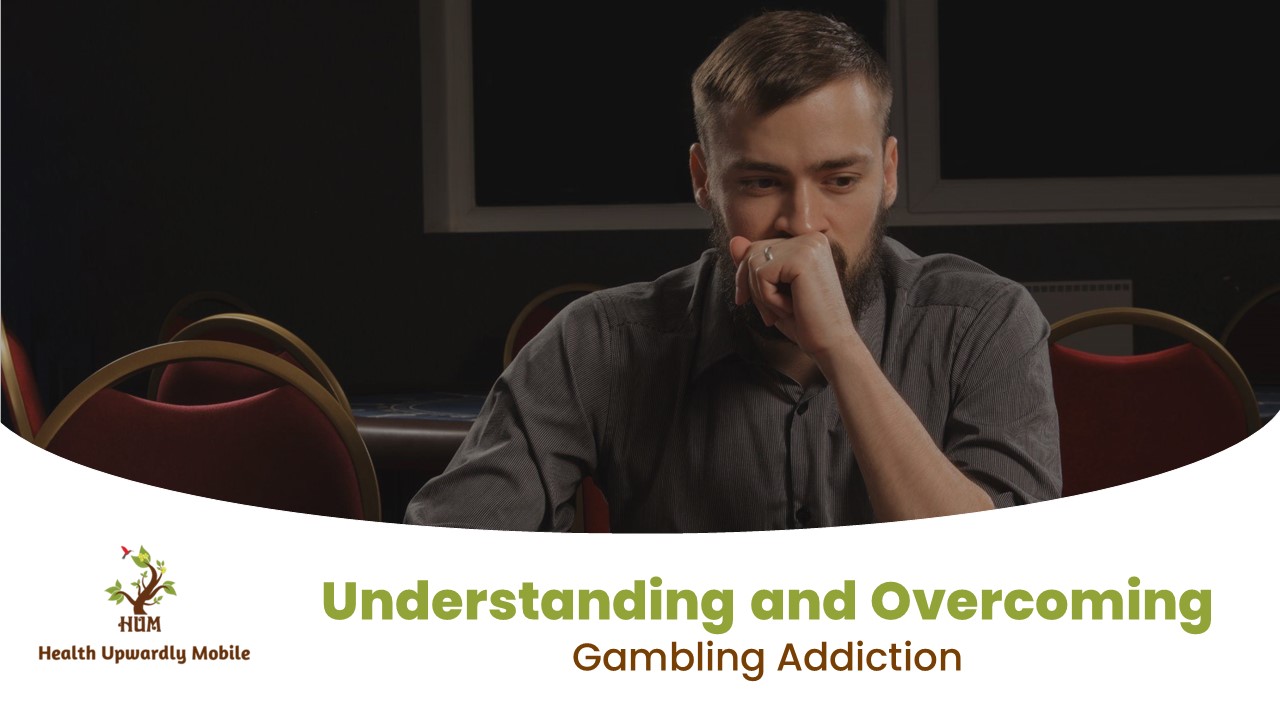Understanding Gambling Addiction - PowerPoint PPT Presentation
Title:
Understanding Gambling Addiction
Description:
Gambling issues can affect people from all walks of life, turning what was once a lighthearted pastime into an unhealthy preoccupation with significant consequences. – PowerPoint PPT presentation
Number of Views:4
Title: Understanding Gambling Addiction
1
Understanding and Overcoming Gambling Addiction
2
INTRODUCTION
Gambling issues can affect people from all walks
of life, turning what was once a lighthearted
pastime into an unhealthy preoccupation with
significant consequences.
Whether it's betting on sports, trying your luck
with scratch cards, spinning the roulette wheel,
playing poker or slots, gambling addiction can
strain relationships, disrupt work, and lead to
financial challenges.
3
Table Of Content
Myth vs Fact
Clarifying Common Misconceptions About Gambling
Addiction
Recognizing Signs and Symptoms of Gambling
Addiction
Shedding Light on Gambling Addiction
Getting help for Gambling Addiction
Dealing with Cravings
Coping with relapses
Strategies to abstain from Gambling
Gambling Addiction Treatment
4
Shedding Light on Gambling Addiction
Gambling addiction, also known as pathological
gambling, compulsive gambling, or addiction
involving gambling, is about seeking escape,
reward or relief. If you find that you have
impaired control when it comes to gambling,
regardless of the negative effects it has on you
and your loved ones, you may have gambling
addiction. It's important to acknowledge that
addiction doesn't discriminate based on your
financial situation, and it can affect anyone.
5
Clarifying Common Misconceptions About Gambling
Addiction
Myth vs Fact
To successfully manage gambling addiction, it's
important to separate fact from fiction. Let's
dispel some common myths
01
Myth To have a gambling issue, one must gamble
daily. Fact Addiction involving gambling can
manifest as frequent or infrequent gambling. The
frequency isn't the sole determining factor.
03
02
Myth Having a gambling problem reflects weakness
or irresponsibility. Fact Gambling problems can
affect people of all intelligence levels and
backgrounds.
Myth Problem gambling is not an issue if the
gambler can afford it. Fact Excessive gambling's
consequences aren't limited to finances.
6
Loss of controlAn inability to walk away when
gambling, resulting in spending the last dollar
and chasing losses
Recognizing Signs and Symptoms of Gambling
Addiction
Gambling addiction is often referred to as a
"hidden illness" because it lacks the obvious
physical signs and symptoms found in drug or
alcohol addiction.
Secrecy about gambling Gambling in secret or
being less than honest about its extent.
7
Getting Help for Gambling Addiction
The first step with gambling addiction is
acknowledging that there is an issue. It takes
significant courage, especially when it involves
financial losses and strained relationships.
But you don't have to handle this problem by
yourself and help is available.
8
Strategies to abstain from Gambling
Abstaining from gambling is a recommendation for
those struggling with impaired control.
9
Dealing with Cravings
Developing a solid support recovery network and
making healthier decisions will help you work
through your cravings
Visualize the consequences of giving in to
gambling urges. Play the tape through to the end.
Avoid isolation by contacting friends or
attending support groups.
.
Become more aware of stress, environment and
exposure so you can be more proactive.
Reach out to recovery supports when you are
struggling with cravings, this will help reduce
the desire to act out.
10
Dealing with Relapses
Relapses can be part of the recovery process.
Learning from mistakes and persevering is vital
in getting back into recovery. It's important
to have some self compassion and consider
progress not perfection.
11
Gambling Addiction Treatment
Professional treatment is a crucial step on the
path to recovery. Although there are lots of
commonalities, everyone is unique, and tailored
treatment is essential. Options include
inpatient or residential treatment, intensive
outpatient or outpatient therapy. The key is
continuing care as addiction is a chronic disease
and episodic care is not as effective.
12
Contact Us
5316 7005 Fairmount Drive SE Calgary, AB T2H 0K4
https//healthupwardlymobile.net
1 403-536-2480
info_at_humassociates.net
13
(No Transcript)































